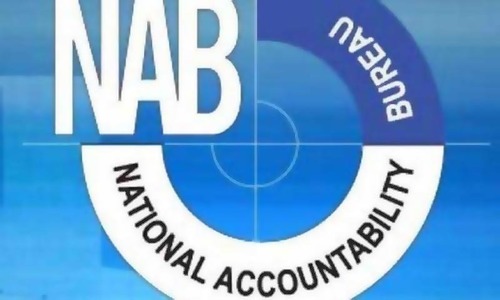KARACHI: The Supreme Court of Pakistan observed on Friday that voluntary return of the embezzled money by public servants under the provisions of the National Accountability Bureau Ordinance was increasing corruption and such officials should not be allowed to remain in service.
A two-judge bench headed by Justice Amir Hani Muslim observed that those held for corruption were taking advantage of the voluntary return scheme and plea bargains and getting reinstated to enjoy their respective offices.
The bench was hearing a NAB appeal against the accountability court’s order that refused the remand of a private person in a fraud case.
NAB had filed an appeal before the Supreme Court against the high court and administrative judge of the accountability courts order that refused the remand of a private suspect in a land fraud case in Korangi as he was not a public functionary.
It remarked that the provincial and federal governments did not take any action against those who benefitted through the voluntary return and plea bargain schemes under the NAB law.
The court observed that it was not an issue in Sindh alone where officials involved in corruption got undue relief through the VR and plea bargain schemes.
It also remarked that the National Accountability Bureau was wasting its energies on micro corruption instead of concentrating on mega scandals of corruption.
Expressing grave concern over the matter pertaining to voluntary return and plea bargain schemes, the bench observed that it was imperative to review the implications of these schemes and referred the matter to the Chief Justice of Pakistan for constituting a larger bench in that regard.
The court issued notices to the attorney general of Pakistan, the chairmen of NAB and provincial anti-corruption establishment and advocates general of the four provinces to file their respective reports.
On Friday, the DG and prosecutor general of NAB appeared in court and filed a report of cases pertaining to corruption of relatively lesser amounts.
Justice Hani observed that the initial perusal of the report revealed that there were 28 references pertaining to corruption of less than Rs10 million. The bench observed that frequent practice of voluntarily return powers by NAB was not only a loss of the nation but it also increased corruption.
Justice Hani remarked that the exercise of Section 25(A) by NAB under the VR scheme was prima facie in conflict of various provisions of the Constitution and such powers could only be exercised by the judicial forum as routinely after payment of the VR the accused was free without any departmental proceedings.
It further observed that this aspect required to be examined in light of the Constitution wherein a civil servant could not be allowed to take benefit under Section 25(A) of the NAB Ordinance.
The court ordered the NAB chief to place on record details of corruption cases involving an amount less than Rs10 million, names of persons/ civil servants who entered into voluntarily return scheme and had not been proceeded against by the departments.
The NAB prosecutor general submitted that NAB issued letters to the departments concerned of the federal or provincial assemblies in case civil servants entered into voluntarily return and it was the duty of the government to initiate departmental proceedings in case the employees entered into VR.
The court observed that the wisdom of legislature was to empower NAB to conduct inquiries/ investigations into mega corruption scandals rather encroaching the jurisdiction of the anti-corruption or federal investigation agencies.
The court observed that NAB’s directors general of the provinces were not implementing their own standard operative procedures and particularly in Sindh such SOPs were bypassed by the DG for reason best known to him and such discretion was also against the spirit of the Constitution and provision of the NAB Ordinance.
The court referred the matter to the CJP for taking up such an issue to lay out pecuniary jurisdiction of NAB and cases of such nature falling within the domain of the anti-corruption and federal investigation agencies.
Meanwhile, the NAB prosecutor general withdrew the appeal filed on behalf of NAB against the rejection of remand of a private person by the accountability court.
Published in Dawn, September 3rd, 2016













































